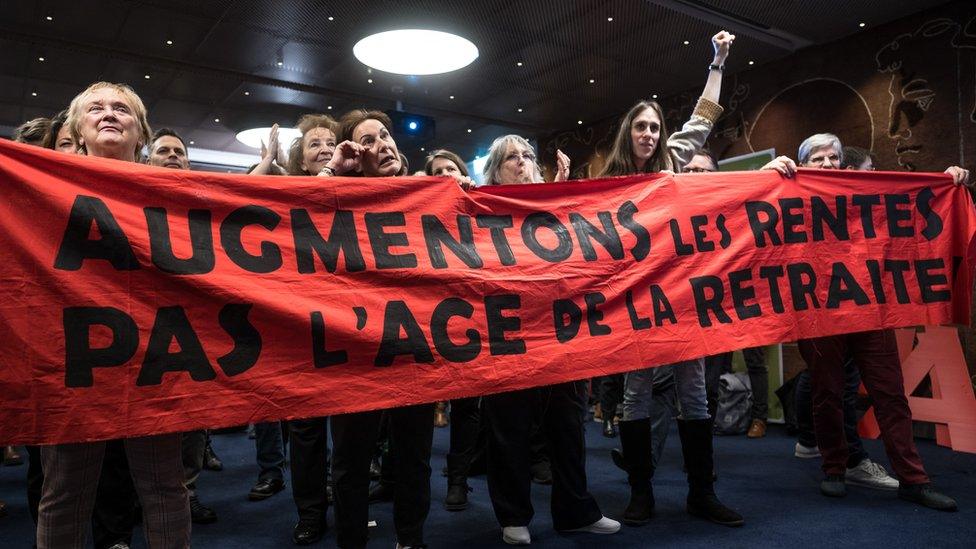Swiss vote to give themselves a bigger pension
- Published

Supporters of the extra pension across the country - like in this photo from Bern - celebrated the referendum's results
Swiss voters have given themselves an extra month's pension each year - in a nationwide referendum focusing on living standards for the elderly.
The government had warned that the increased payments would be too expensive to afford.
But almost 60% of voters said 'yes' in Sunday's poll. Separately, 75% rejected raising the pension age from 65 to 66.
The maximum monthly state pension is €2,550 (£2,180; $2,760) - not enough, many say, to live on in Switzerland.
The cost of living in Switzerland, particularly in cities such as Zurich and Geneva, is among the highest in the world.
Health insurance premiums, which are obligatory for everyone, have been rising fast, and older people sometimes struggle to pay them.
Women who may have had work breaks to raise a family, and immigrants recruited decades ago to work in Swiss factories, restaurants, or hospitals, can find it particularly difficult to make ends meet.
More and more people are working into their 70s not out of choice, but out of necessity. Meanwhile among the younger generation, work related stress and burnout are increasing.
The proposal to increase pensions came from the trades unions - but was opposed by the Swiss government, parliament, and business leaders, who argued it was unaffordable.
Voters in Switzerland often take their government's advice about money matters: a few years ago they actually rejected an extra week's holiday a year.
This time they said enough was enough, using the power that Switzerland's system of direct democracy gives them to vote themselves an extra month's pension each year.
The initiative also secured the required double-majority: getting the popular vote, and also majorities in most of the country's 26 cantons.
The result was described as a "historic victory for retirees" by Avivo, a Swiss association that defends the rights of current and future pensioners.
The move brings the state pension into line with Switzerland's salary system, which is also paid in 13 instalments, meaning workers get a double payment in November.
The system was originally designed to help people ahead of Christmas, and the annual tax bill. As Swiss retirees pointed out, pensions were taxed too, and Christmas fun did not stop at 65.
In a further sign the Swiss are keen that life should not be all work and no play, they also overwhelmingly rejected raising the retirement age.
These votes would, the government said repeatedly, have to be paid for.
Voters, though, looking at Switzerland booming economy, whose success is in large part thanks to their hard work, clearly believe their country can afford it.
Related topics
- Published2 November 2020
- Published29 November 2020
- Published5 June 2016
- Published19 June 2023